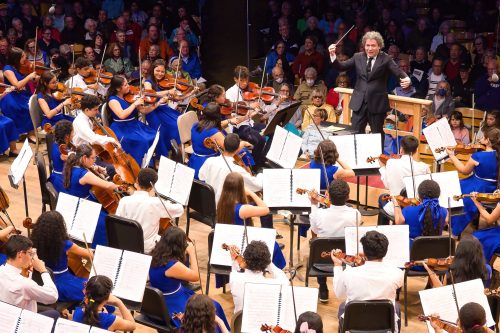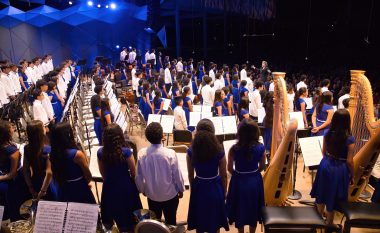 United States Tanglewood Competition 2024 [12] – Adams, Estévez, Ginastera, Shostakovich: Nationwide Kids’s Symphony of Venezuela / Gustavo Dudamel (conductor), Koussevitzky Music Shed, Lenox, 8.8.2024. (CSa)
United States Tanglewood Competition 2024 [12] – Adams, Estévez, Ginastera, Shostakovich: Nationwide Kids’s Symphony of Venezuela / Gustavo Dudamel (conductor), Koussevitzky Music Shed, Lenox, 8.8.2024. (CSa)

John Adams – Brief Experience in a Quick Machine
Antonio Estévez – Mediodia en el Llano (‘Noon on the Prairie’)
Alberto Ginastera – Dances from Estancia (‘The Ranch’), Op.8
Shostakovich – Symphony No.5 in D minor, Op.47
The current and far anticipated look at Tanglewood by the Nationwide Kids’s Symphony of Venezuela (NCSV) beneath maestro Gustavo Dudamel – representing the fourth and remaining leg of their US tour – was not merely one of many musical highlights of this 12 months’s competition, and a culturally important and profoundly memorable occasion. It was additionally a tremendous organisational triumph. Some 173 brilliantly completed younger musicians aged 10-17 years plus devices, accompanying adults and various directors had flown from crisis-torn Venezuela to play in Los Angeles, New York, and Ravinia earlier than their arrival in Lenox, Massachusetts.
The orchestra is a product of Venezuela’s transformative nationwide music training programme which is often referred to as ‘El Sistema’ or ‘the System’. It was based by José Antonio Abreu, a Venezuelan economist and beginner musician. In 1975, Abreu began Social Motion for Music, with two principal objects: first, to prioritise music training all through Venezuela, and secondly, to supply weak and deprived younger folks with a possibility to flee lives of crushing poverty and crime. The programme has proved wildly profitable in communities largely excluded from correct training and social privileges, and for over 30 years – each in periods of stability and political turmoil – has been funded by central authorities. This has resulted within the creation of lots of of younger folks’s orchestras all through Venezuela together with, most famously, the Simón Bolivar Youth Orchestra. A principal beneficiary of El Sistema and Abrue’s former protégé is the charismatic Gustavo Dudamel or ‘The Dude’ as he’s recognized to his many followers. Now simply 43 years previous, he was lately appointed Conductor Designate of the New York Philharmonic, after 14 years as Music and Creative Director of the Los Angeles Philharmonic He was solely 18 when he turned the Music Director of the Simón Bolivar.
Dudamel, a dedicated advocate of El Sistema, fervently believes within the energy of music training to alter the world. As a proud Venezuelan and most outstanding ambassador of ‘the System’, he stands on the complicated interface of politics and music. He isn’t a political activist within the standard sense, brazenly essential of the present regime. Neither is he, as some mistakenly consider, an apologist or entrance man for the nation’s dictatorship. Latest criticism by human rights organisations accusing him of utilizing the NCSV to supply cowl for self-proclaimed President Maduro is wholly misconceived. Within the phrases of American conductor and educationalist Leon Botstein, ‘To talk out in opposition to tyranny definitely takes braveness, since speech is a type of motion. However to [further] a programme with deep roots in society that develops the minds and expertise of underserved and impoverished younger folks on an enormous scale takes an altogether totally different type of braveness.’
In a delicate admonition to the Venezuelan authorities from the rostrum of Tanglewood’s Koussevitzky shed, Dudamel identified to his critics that ‘the ability of concord is one of the best car for change’ earlier than launching right into a extensively different, and technically difficult programme comprising works by John Adams, Antonio Estévez, Alberto Ginastera and Dmitri Shostakovich.
Dudamel determined to jump-start the night with Adams’s excessive velocity Brief Experience in a Quick Machine, and what higher piece to harness the youthful ebullience of the gamers. Written in 1986, it depicts the composer’s expertise of a white-knuckle journey in a buddy’s ‘very fancy sports activities automotive’, and one he virtually wished he hadn’t taken. The viewers skilled no such regrets. The journey started slowly with the rhythmic beat of woodblocks, which have been quickly joined by gleaming trumpets, propulsive clarinets, synthesizers and sonorous strings because the music gathered tempo. Along with his foot on the accelerator however his arms firmly on the wheel, Dudamel ran his orchestral engine with mechanised precision and ramped up the power all the best way to the thrilling conclusion.
Though hardly a pit-stop, Antonio Estévez’s leisurely pastoral tone poem Mediodia en el Llano (‘Noon on the Prairie’), an unlimited, swaying pampas of sound overlaid with tender melodies from the strings, supplied a possibility to admire the flexibility of the gamers to discover the luminous textures lurking beneath the music, and enabled us to marvel on the subtlety of instrumental methods displayed.
One knew these gifted younger musicians may play however who knew they might additionally sing as effectively? In a shock departure from the revealed programme, the gamers downed their devices, stood and joined collectively in a deeply non secular and really lovely rendition of two quick choruses by Abreu himself: Sol que das vida a los trigos and Gloria in excelsis deo.
Subsequent got here a set of 4 Dances from Estancia, an adrenalin-fuelled orchestral suite by Argentinian composer Alberto Ginastera. Distilled from a ballet commissioned in 1942 for Lincoln Kirstein’s American Ballet, the piece bears the affect of Aaron Copland who Ginastera significantly revered, and who he met at Tanglewood in 1946. The orchestra clearly relished the primary dance, an earthy, boisterous romp entitled Les trabajadores agrícolas (‘The Farm Staff’), and extracted a candy lyricism from the second dance, Danza del trigo (‘Dance of the Wheat’). One may virtually detect the rumbling of horses hooves and the coarse shouts of the employed arms in an evocatively carried out Los peones de hacienda, whereas within the infectiously rhythmic fourth motion Malumbo, discovered the musicians of their component, swaying, swinging and joyfully elevating their devices like fully-fledged members of a Nineteen Thirties dance band.
The second half of the live performance was devoted to at least one work, Shostakovich’s Fifth Symphony. An attention-grabbing selection, given its historic and political context. Written in 1937 after Stalin’s private condemnation of Shostakovich’s publicly acclaimed opera, Girl Macbeth of the Mtsensk District, the composer was formally rebuked and threatened with cultural banishment or worse. His symphonic response was a deeply ironic work which he inscribed ‘a Soviet artist’s inventive reply to only criticism’. With its mixture of heartfelt tragedy and satirical bombast, Shostakovich cunningly defied the authorities, making certain his bodily survival however preserving his creative integrity. Most of the gamers within the NCSV have been definitely too younger to understand the symphony’s underlying nuances, however Dudamel, the general public face and guardian of El Systema at a time of political upheaval in Venezuela, couldn’t have been unaware of the parallels.

The orchestra definitely responded beneath Dudamel’s expressive baton, and to the real love he extends to his younger fees. Whereas understandably their efficiency lacked the bodily heft and emotional depth that older and extra skilled musicians can carry to bear, it was nonetheless a unprecedented technical accomplishment. Sure, the opening bars of the Moderato may maybe have been extra acerbic, and the pitiless, terrifying march part extra dramatic, however the second motion Allegretto – a vibrant peasant-like dance – was distinguished by full of life contributions from the winds, and a gently modulated dialog between first violin and principal flute was beautiful. A plaintive oboe solo launched the Largo – a poignantly performed lament through which the pianissimo strings hovered suspensefully – earlier than the sardonic remaining Allegro non troppo. Right here Dudamel inspired the swelling brass and jarring percussion to let rip in chillingly relentless, and magnificently performed goosestep coda. This thrilling efficiency which left one speculating as to what this band would possibly accomplish ten years from now.
Though Shostakovich’s Fifth was the final dish on Dudamel’s revealed menu, it was not at all the tip of the feast. Encores included Aldemaro Romero’s Fuga con pajorillo, a Bach-like fugue fused with a pajorillo fashion Venezuelan dance. The center part featured 4 sensible younger musicians who jammed ecstatically on Llanera harp, cuatro, bass and maracas, drawing cheers and gasps of admiration from the capability viewers. Demanding but extra, the emotional crowd was rewarded with ‘Mambo’ from Leonard Bernstein’s West Aspect Story after which the beaming, dancing, instrument twirling orchestra and their conductor acquired roof-raising applause. Amid all of the clapping, whooping and hollering, somebody within the entrance row of the Shed’s auditorium unfurled a big Venezuelan flag. This was no hole gesture of help for an autocratic dictator and his henchmen, however absolutely supposed to rejoice El Sistema, and the ability it provides younger folks to remodel lives and alter the world.
Chris Sallon


